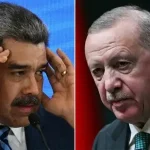
JERUSALEM: The British parliament’s vote to recognise a Palestinian state should concern Israel, Britain’s ambassador to the Jewish state suggested on Tuesday, saying it reflected shifting public sentiment in Britain and around the world following the war in Gaza.
The vote will not change London’s policy, British officials have said. But Ambassador Matthew Gould said it was “significant” because it revealed negative attitudes towards Israel following its 50-day war with the Islamist group Hamas.
Also read: British MPs pass non-binding vote to recognise Palestine
The violence ended with a truce but left more than 2,100 Palestinians dead, most of them civilians, according to the United Nations. On the Israeli side, 72 people died, most of them soldiers.
In an interview to Israel Radio, Mr Gould suggested that although the vote was symbolic, Israel should take note. “I think it is right to be concerned about what it signifies in terms of the direction of public opinion,” he said.
Vandals set fire to a mosque in West Bank
The vote on Monday in the House of Commons came nearly 100 years after Britain issued its Balfour Declaration in 1917, which affirmed its support for establishing a home for the Jewish people in Palestine. Israel was founded in 1948.
Israel’s recent settlement activity, such as last month’s approval of the construction of more Jewish housing in east Jerusalem, has “a very corrosive effect on international opinion”, the British envoy added.
The resolution was welcomed by the Palestinians. “It will enhance the European voices calling for the recognition of the State of Palestine and will create the right environment for the international community to grant the Palestinian people legal parity and rights,” senior Palestine Liberation Official Hanan Ashrawi said in a statement.
Palestinian Foreign Minister Riyad al-Malki urged London to “immediately recognise the state of Palestine”, while the Islamist movement Hamas said the parliamentary motion was symbolic only.
“This symbolic vote is an important sign that the international community is changing its attitude in regard to the occupation’s crimes, but it is still a symbolic move,” Hamas spokesman Sami Abu Zuhri said.
Israel’s foreign ministry claimed the vote undermined peace efforts because Palestinian statehood should come about only as a result of negotiations with Israel.
“Premature international recognition sends a troubling message to the Palestinian leadership that they can evade the tough choices that both sides have to make,” the ministry said.
Tuesday marked the 20th anniversary of Palestinian leader Yasser Arafat and Israeli leaders Yitzhak Rabin and Shimon Peres receiving the Nobel Peace Prize for launching the Oslo peace process.
British MPs voted 274 to 12 for a non-binding motion to “recognise the state of Palestine alongside the state of Israel as a contribution to securing a negotiated two-state solution”.
Prime Minister David Cameron and other government leaders abstained, and more than half of the 650 Commons members did not participate in the vote.
But the motion had support from both government and opposition lawmakers, who said it could help jumpstart the peace process. “The only thing the Israeli government in my view, under the present demeanour of (Israeli Prime Minister Benjamin) Netanyahu, understands is pressure,” said Labour Party legislator Jack Straw.
Britain’s government is an ally of Israel, but public support for the Palestinians runs high. Demonstrators have staged multiple street protests against Israel’s policies, and British academic and other groups have voted to boycott their Israeli counterparts.
In 2012, the UN General Assembly voted to recognise a state of Palestine on territories captured by Israel in 1967. The United States and many European countries have not followed suit. But earlier this month, Sweden’s Prime Minister Stefan Lofven said his government would recognise the state of Palestine, an announcement that drew praise from Palestinian officials and criticism from Israel.
VANDALISM: In the West Bank, meanwhile, suspected Israeli vandals set fire to a mosque and left Hebrew graffiti in the village of Aqraba on Tuesday. The mosque’s carpet was scorched, walls had burn marks, and holy books were covered in soot.
The graffiti referenced the name of a late American-Israeli ultranationalist rabbi, a nearby Jewish settlement, and included the words “price tag”, a slogan for assaults carried out by Jewish extremists in response to Palestinian or Israeli actions against them.
Israeli police said they were investigating.





